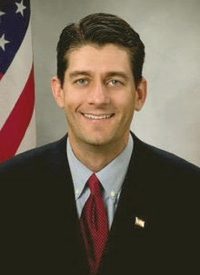
Despite predictable outcries against a plan advertised as a $5.3-trillion cut in federal spending over the next 10 years, House Budget Committee Chairman Paul Ryan (R-Wis., left) says voters are ready to embrace the kind of cuts he has outlined in his proposed budget. Appearing on the "Morning Joe" show on MSNBC shortly before the release of his spending plan Tuesday, Ryan acknowledged he had been advised by some of his Republican colleagues not to propose deep spending cuts, especially to Medicare, in an election year. But, the budget chairman argued, the mounting national debt and growing concerns about its effect on the nation's economy have changed the public's attitude toward spending cuts.
"I believe that's not the politically risky thing anymore," Ryan said. "We're borrowing 40 cents on every dollar. And the President gave us a budget that just makes it worse. I think the wrong thing, just from a political standpoint, is ducking this issue, ducking responsibility and failing to fix this crisis."
Ryan's budget does include changes to Medicare, but they are designed to slow the growth, rather than cut the program, by providing an alternative he calls "guaranteed health options" for younger Americans. He proposes cuts in a wide variety of entitlement discretionary spending programs.
"We're saying we've got to cut $5.3 trillion right now to pre-empt the crisis and make sure that seniors don't get cut in the middle of retirement," Ryan stated. "If you don't do that, then everybody will get hurt, and it will get ugly." Asked how he thought the public will respond to his proposals, Ryan replied, "I think people are ready to be talked to like adults and not pandered to like children."
While the plan, labeled the "Path to Prosperity," may win passage in the Republican House, despite reported misgivings on the part of some GOP strategists, it stands virtually no chance in the Democratic Senate, where Finance Committee Chairman Max Baucus has already declared it dead on arrival. The Obama White House is also aligned in opposition. With a reference to the Ryan budget plan that failed to pass last year, White House Communications Director Dan Pfeiffer issued a statement Tuesday saying the latest version "once again fails the test of balance, fairness and shared responsibility."
"Independent experts agree the House plan would make deep cuts to the Medicare benefits seniors count on," according to a statement issued by Baucus, a Montana Democrat. "It would end Medicare as we know it and funnel Medicare dollars directly into private insurance companies' pockets. Under the House plan, seniors' coverage would be cut drastically, benefits would no longer be guaranteed and seniors' costs would skyrocket. We can't allow the House to balance the budget on the backs of seniors and we won't — not on my watch," declared the Finance Chairman.
Writing in the Washington Post's Wonkblog, Ezra Klein noted that while Medicare is getting the headlines and most of the sound and fury in the controversy over the plan, the popular federal health care program for seniors would not bear the brunt of Ryan's long-term spending plan.
"In 2030, spending on Medicare is .75 percent of GDP lower than in the alternative fiscal scenario," wrote Klein. "In fact, Ryan and the Obama administration have proposed the same rate of growth for Medicare: GDP + 0.5 percent." The Medicaid program and other health care spending, including the Affordable Care Act enacted in 2010, would endure deeper cuts, Klein said. "So Ryan's cuts to health care for the poor are almost twice the size of his cuts to health care for the old."
While the plan has been called "bold" in some quarters, it is clearly not bold enough for some of Ryan's GOP colleagues and conservative activists who want a more rapid movement toward a balanced budget and a reduction in the national debt, generally estimated at somewhere in excess of $15 trillion. Rep. Ron Paul (R-Texas) called the Ryan plan "very disappointing." Paul, a Republican presidential candidate, has proposed cutting federal spending by $1 trillion in his first year in the White House. Rival candidate Rick Santorum called the Ryan budget "a great blueprint," but the former Pennsylvania Senator said that "we need to cut government spending faster" than the $5.3 trillion over 10 years that Ryan proposes. Santorum has called for $5 trillion from current budget projections in five years.
Despite the large swath of programs affected by the Ryan plan, it would take nearly 30 years to reach a balanced budget, with 2040 the target date for producing a budget without red ink. The conservative Club for Growth has called for reaching a balanced budget in no more than 10 years. In a statement issued Wednesday calling Ryan's budget a "disappointment," the organization's president, Chris Chocola, also criticized the plan for abandoning the sequestration feature of the Budget Control Act Congress passed last summer to avoid a government shutdown. Under the sequestration, automatic cuts would occur if Congress could not agree on spending reductions. The feature has been unpopular with many Republicans because of the large dent it would create in military spending.
"It is hard to have confidence that our long-term fiscal challenges will be met responsibly when the same Congress that passed the Budget Control Act wants to ignore it less than one year later," said Chocola "On balance, the Ryan Budget is a disappointment for fiscal conservatives."


